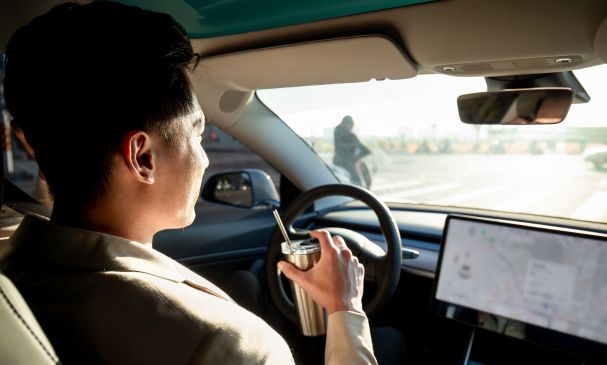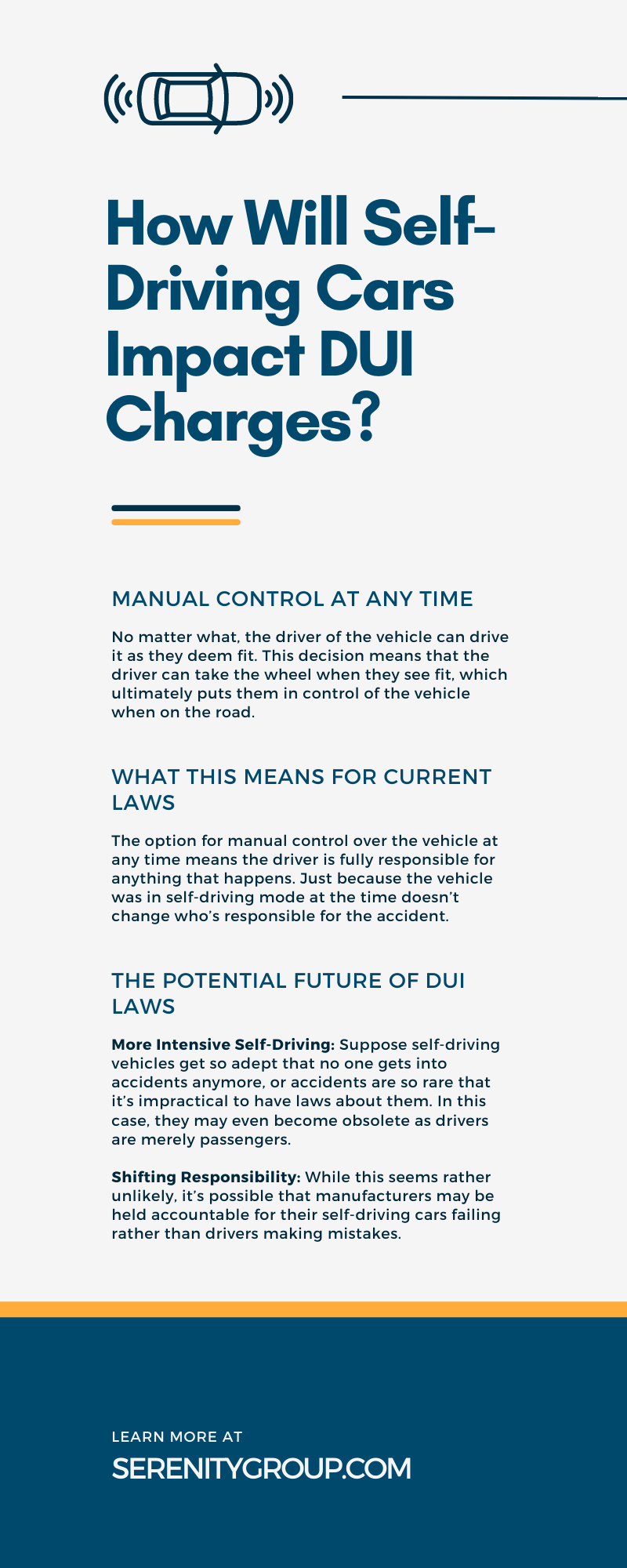How Will Self-Driving Cars Impact DUI Charges?

Certain aspects of a future that science fiction often depicts are always fast approaching, and we are currently seeing that with self-driving vehicles. These cars are capable of navigating to a location and viewing their surroundings to avoid collisions. However, this technology is still advancing and only now starting to hit the roads. The introduction of this technology does pose some very interesting questions for potential buyers and users. One thing that people should know is how self-driving cars may impact laws regarding DUI charges.
The Purpose of Self-Driving Cars
The exact use and implementation of self-driving cars are complex and cover a wide range of possibilities. It’s impossible to say what the future will look like regarding these cars, but we know it includes improved road safety, increased travel speeds, and more driving accessibility.
Current Implementation
As it stands, self-driving cars don’t really have a use on the road. The technology isn’t fully autonomous yet to allow such use safely. However, many cars use technology at some level to make driving easier and safer for drivers. Automatic braking and parallel parking, for example. As time goes on, more vehicles will use this technology in greater capacities.
Where Lies the Responsibility?
In an ideal world, cars are fully autonomous, and drivers never have another accident. However, accidents will still happen even with all the automatic safety features switched on. The question is, how does one determine who’s at fault in if the drivers were using an automatic driving feature? The answer lies in how automatic driving works.
Manual Control at Any Time
Even when someone uses a car that’s currently driving by itself, they keep full control of the vehicle. No matter what, the driver of the vehicle can drive it as they deem fit. This decision means that the driver can take the wheel when they see fit, which ultimately puts them in control of the vehicle when on the road.
What This Means for Current Laws
The option for manual control over the vehicle at any time means the driver is fully responsible for anything that happens. Just because the vehicle was in self-driving mode at the time doesn’t change who’s responsible for the accident. Therefore, traditional road safety laws still apply to self-driving vehicles and the drivers in them.
Punishments for DUIs
Now for the answer to the big question: how will self-driving cars impact DUI charges? Drivers must be alert and capable of responding to any situation while inside their vehicles, even if it’s a self-driving car. This level of caution and responsibility means that driving while under the influence is still a dangerous and illegal activity. The punishments for the crime are the same as those for drivers of non-self-driving vehicles, which change depending on the state. They can vary between fines and license suspension and often require the need for cheap SR-22 insurance online.
The Potential Future of DUI Laws
It’s impossible to determine what will happen in the future with technology’s fast-paced evolution, but we can make some guesses as to the potential changes. The best way to do that is to look at the benefits of self-driving cars.
Preventing Accidents
One of the main features of auto-driving technology focuses on stopping car accidents. Sensory technology allows a vehicle to detect when something is in the way and apply the brakes to stop quickly. The vehicle enacts this automatic braking system without the assistance of a driver, so they can avoid an accident they don’t see it coming. Some experts predict that this technology could reduce accidents by 90%, especially in drunk and distracted driving cases.
Traffic Efficiency
With enough self-driving cars on the road and better navigational technology, these vehicles can have a great impact on traffic efficiency. We have all felt frustrated at some point by huge backups and traffic jams, but these self-driving vehicles can bypass each other safely without all the stop-and-go traffic. This efficiency can decrease travel times and help prevent big traffic jams across the country.
Better Transportation Access
Some people don’t have access to vehicles or cannot drive for various reasons. These self-driving cars could be the answer for many of these individuals, as they can work as temporary drivers and help others get where they need. Everyone deserves the ability to travel safely, especially on the road.
Good Environmental Impacts
Another potential benefit of these vehicles is that they emit fewer carbon emissions. These cars consume as little fuel as possible by shortening driving time and using safe driving practices. This lesser consumption of fuel means that they put out fewer emissions and have a positive environmental impact compared to traditional vehicles.
More Intensive Self-Driving
It all depends on how people use these vehicles and technology’s growth when it comes to the future of DUI laws and self-driving vehicles. Suppose self-driving vehicles get so adept that no one gets into accidents anymore, or accidents are so rare that it’s impractical to have laws about them. In that case, legal opinion may shift to nullify DUI charges. In this case, they may even become obsolete as drivers are merely passengers.
Shifting Responsibility
Another possibility is that the blame shifts away from drivers to the vehicles themselves. Because people don’t need to pay attention anymore, as the car will take care of it all, the accident’s fault no longer lies with the driver. While this seems rather unlikely, it’s possible that manufacturers may be held accountable for their self-driving cars failing rather than drivers making mistakes.
These are only a few potential changes that may occur in the future of self-driving cars. However, it’s much more likely that the current laws will stay the same for a long time, even with technological advances. People will want to wait to see if self-driving cars are safe, then lawmakers may consider changing specific road safety laws. Those changes will add at least a few extra years to the self-driving car rollout process, but some laws may never change, depending on the implementation of the technology. Nevertheless, it’ll be quite exciting to see a car drive itself while you sit back and enjoy the ride, knowing you can still take control if you need to.


Recent Comments